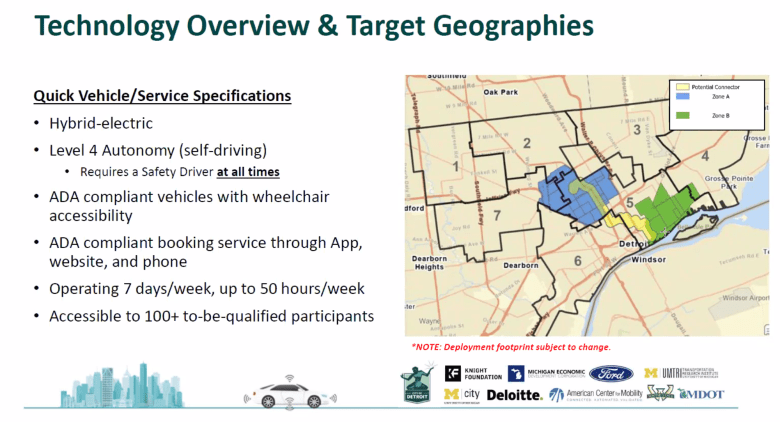Detroit is launching a first-of-its-kind program to transport seniors and disabled residents with self-driving shuttles.
The city’s Office of Mobility Innovation (OMI) is using a $2.5 million federal grant to test automated shuttles – chaperoned at all times by a human in the driver’s seat – for seniors and Detroiters with disabilities in two zones. Council is set to accept a contract with Ann Arbor-based May Mobility, Inc. on Tuesday, which allows the city to start road testing hybrid shuttles in Detroit early next year before opening the service to passengers in late 2024.
“(The pilot program) will allow the city to further understand how these types of mobility solutions can better address residents’ needs, and how those solutions can be integrated into the city of Detroit in a meaningful and safe way,” said Tim Slusser, the OMI chief for Detroit. “This presents an opportunity for us to enhance education and trust.”

Detroit officials are hoping to be at the forefront of autonomous vehicle research. Other organizations like Ford Motor Co. and Mobileye are already testing self-driving cars in the city. A 25-mile lane on I-94 connecting Ann Arbor to Detroit is also being planned for autonomous vehicles.
Public Works Deputy Director Dayo Akinyemi said Detroit is among the first cities in the country to receive federal funding for self-driving transportation services. The program will provide “mobility equity” for older residents and people with disabilities while collecting data to inform broader efforts to bring autonomous public transportation to the Motor City.
“The experiences that will be gathered from Detroit are going to be part of the national standard for autonomous driving systems in the country,” Akinyemi said during a Monday council committee session. “There were other communities competing with us that did not win because they don’t have the weather we have. They also didn’t have the kind of demographics we’re proposing.”
The program is separate from the city’s existing paratransit service, Slusser said, and won’t be replacing it. Detroit is home to 128,000 residents who have a disability, according to the city.
“We want to collect information and understand the feedback from community members so we can improve existing services and design new services that fill in the gaps,” Slusser said. “This is about helping the city understand how we can create more services, provide better services and make those services sustainable.”

Three hybrid shuttles operating 50 hours across seven days per week would be able to serve 100 participants. All vehicles will be compliant with the Americans with Disabilities Act and be able to carry wheelchairs. The city is creating a service for users to book rides through a smartphone app, website and hotline.
The shuttles would operate in two zones covering neighborhoods in the center part of the city north of downtown, and another area covering southeast neighborhoods largely between the Detroit River and Gratiot Avenue. A connecting route linking the two zones is also being considered, Slusser said.
Slusser said census data helped the city identify areas with a high concentration of adults over 65 who are living in poverty and have less access to a car. The zones include points of interest like doctors offices, grocery stores and pharmacies.

Self-driving shuttles will be tested at the University of Michigan’s Mcity Test Facility and a Ypsilanti site managed by the American Center for Mobility before coming to Detroit for another round of testing on local streets.
The program will create eight full-time jobs. Slusser said May Mobility agreed to hire Detroiters, which gives residents a chance to gain experience in an emerging industry.
The project is spearheaded by OMI and Department Public Works in consultation with the Michigan Department of Transportation (MDOT). Other partners include Ford Motor Co, Deloitte, the Michigan Economic Development Corporation, American Center for Mobility, Wayne State University and the Knight Foundation.
Slusser said the city will also work with stakeholder groups like Detroit Disability Power. Additional funding will be sought to increase the number of shuttles, he said.
The city has been collecting feedback on autonomous vehicles from residents through focus groups and surveys over the last year. Slusser said the feedback will be helpful when deciding how residents sign up for a ride. Some residents reported problems with having to schedule rides weeks in advance, he said, which can become a barrier when medical appointments are rescheduled on short notice.
“This is not a ‘if you build it, they will come’ (scenario),” Slusser said. “There are a lot of questions that come with these types of technologies and individuals who ride need to understand why they’re safe.”
Autonomous vehicles will have a driver behind the wheel 100% of the time, Slusser said.
“This is for a number of reasons, not the least of which is safety,” Slusser said. “We can’t have technologies that are struggling to navigate themselves around our city in the instance of, you know, snow or rain or other obstacles. That individual will also be there to provide assistance to anybody that needs help getting on and off the vehicles as well.”


As a senior, I find this very exciting, though I wonder who will qualify, so I look forward to learning more.